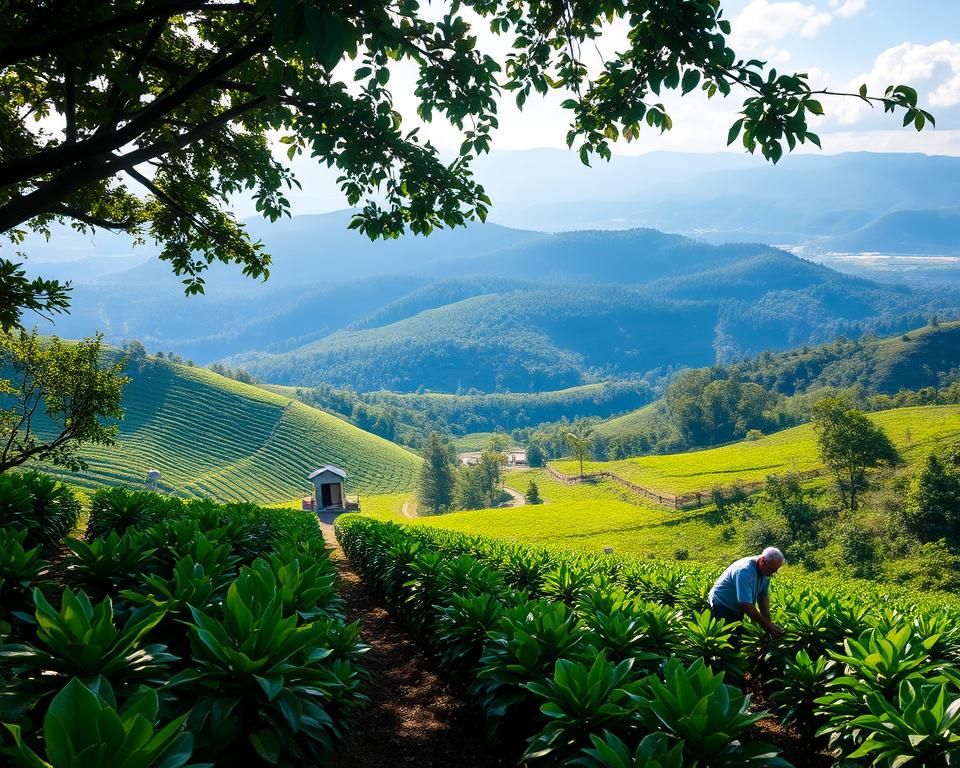Welcome to the world of specialty coffee, where every cup is a sensory journey. Specialty coffee is about the highest quality beans, grown in specific regions. They are harvested at peak ripeness and processed with great care. This coffee is often linked with artisan and single origin varieties, celebrated for their distinct flavors and superior quality.
The specialty coffee industry is expanding rapidly. The Specialty Coffee Association (SCA) is at the forefront, being the largest global coffee trade association. The SCA aids the industry through research, setting standards, education, and hosting events. For instance, it organizes North America’s largest specialty coffee trade show, drawing 17,000 attendees. Whether you’re into specialty, artisan, or single origin coffee, there’s a vast array of choices available.
Key Takeaways
- Specialty coffee is defined as the highest quality coffee beans, carefully cultivated and processed.
- The Specialty Coffee Association (SCA) is the largest global coffee trade association.
- Artisan coffee and single origin coffee are types of specialty coffee known for their unique flavors.
- The SCA supports the specialty coffee industry through research, standards, education, and events.
- Specialty coffee is a growing industry, with a wide range of options to choose from.
What is Specialty Coffee?
Specialty coffee refers to high-quality beans, carefully grown, harvested, and processed. This process highlights each bean’s unique flavors and characteristics. It’s closely tied to the third wave coffee movement, which values quality, sustainability, and transparency.
The term “specialty coffee” was coined by Erna Knutsen in 1974. Since then, it has become synonymous with excellence in the coffee world. To qualify as specialty coffee beans, they must score at least 80 out of 100, as determined by the Specialty Coffee Association (SCA). This score considers flavor, aroma, acidity, and defect presence.
Unlike gourmet coffee, which may be pricier but not always of the same quality, specialty coffee is all about excellence. The SCA’s Coffee Value Assessment (CVA) evaluates coffee quality and value. It looks at defect count, moisture content, and bean size among other factors.
- The US had 29,300 specialty coffee shops in 2013, up from 2,850 in 1993.
- Europe accounts for 30% of global coffee consumption.
- Specialty coffee was Europe’s fastest growing major restaurant category in 2016, with an increase of 9.1% from 2014 to 2015.
In summary, specialty coffee encompasses a broad spectrum of high-quality beans. It ranges from third wave coffee to gourmet coffee. It’s defined by its dedication to quality and excellence.
Understanding Coffee Beans
Coffee beans are the heart of a perfect cup of coffee. To fully appreciate specialty coffee, knowing the types of coffee beans is key. Arabica beans are of higher quality, used in premium coffee blends. They are more sensitive to growing conditions, needing a more delicate process for quality.
The coffee bean’s growing process greatly influences its flavor and quality. Soil, climate, altitude, and region all shape the coffee’s taste. Organic coffee farming, with less agrochemicals and pesticides, promotes sustainability and enhances flavor.
Terroir also plays a significant role in coffee flavor. Terroir encompasses environmental factors like soil, climate, and altitude. Fair trade coffee ensures farmers receive fair prices, supporting a sustainable and equitable coffee industry.
Specialty coffee’s unique traits include:
- High-altitude growing conditions
- Hand-picking and careful processing
- Small-batch production
- Emphasis on provenance and traceability
The Brewing Process
The art of brewing specialty coffee is key to unlocking its unique flavors. Each brewing method has its own set of characteristics and needs. For example, manual pour-overs are ideal for brewing one to two cups, while French press takes about four to five minutes.
For those who crave a stronger coffee, espresso stands out with its high caffeine content. The AeroPress is known for its clean taste, unlike French press. Auto-drip machines are also favored for their simplicity and convenience.
When brewing artisan coffee, several factors are crucial. The coffee-to-water ratio, water temperature, and grind size all play a role. Pour-over requires a finer grind, while French press needs a coarser one. High-quality water is also vital, as it impacts the coffee’s flavor. Single origin coffee is highly sensitive to water quality, so filtered water with the right TDS level is essential.
Exploring different brewing methods and techniques can help coffee enthusiasts find their ideal cup. Whether it’s pour-over, French press, or espresso, the goal is to achieve the perfect balance of flavors and aromas. This way, you can fully appreciate the unique qualities of each coffee bean.
Specialty Coffee Tasting
The tasting experience of specialty coffee is as vital as the brewing method. To fully enjoy specialty coffee, one must grasp the art of coffee cupping. This involves assessing the coffee’s aroma and flavor, considering its fragrance, flavor notes, and acidity. Specialty coffee, including third wave coffee, boasts distinct flavors, from fruity and floral to rich and chocolatey.
In the realm of specialty coffee, gourmet coffee refers to high-quality beans, carefully selected and roasted to highlight their unique tastes. Specialty coffee beans are graded on a 100-point scale, with scores of 80 or higher denoting exceptional quality. Coffee experts use a standardized scoring system, evaluating flavor, aroma, and overall quality.
- Flavor profile: Does the coffee have notes of fruit, chocolate, or nuts?
- Aroma: What does the coffee smell like, and how does it change as it cools?
- Acidity: Is the coffee bright and acidic, or smooth and balanced?
By examining these aspects, coffee enthusiasts can deepen their appreciation for specialty coffee’s unique qualities. This helps in developing a more refined palate.
The Role of Roasting
Roasting is a critical step in bringing out the unique flavors of specialty coffee. The roasting process can significantly impact the taste of premium coffee. Whether you prefer organic coffee or fair trade coffee, the roast level greatly influences the flavor profile.
The roasting process involves heating the coffee beans to high temperatures. This causes them to expand and change flavor. Roast levels range from light to dark, each revealing different characteristics in the coffee. Here are some characteristics of different roast levels:
- Light roasts: high acidity, bright and fruity flavors
- Medium roasts: balanced acidity, sweet and smooth flavors
- Dark roasts: low acidity, rich and bold flavors
In conclusion, the roasting process is essential for specialty coffee’s unique flavors. Understanding the differences between light, medium, and dark roasts helps coffee lovers find the perfect cup. This aligns with their taste preferences.
The Specialty Coffee Movement
The specialty coffee movement has seen major changes, molding the industry into its current form. It focuses on quality, uniqueness, and sustainability. Single origin coffee has become popular, offering distinct flavors from various regions.
Important figures have promoted specialty coffee, artisan coffee, and coffee-making art. The rise of third-wave coffee shops has boosted the market. By 2023, the specialty coffee market is expected to hit around $50 billion globally. Key trends include:
- Over 1,500 certified specialty coffee roasters in the U.S. now meet the demand for specialty coffee beans.
- Direct trade between roasters and farmers has seen a 20% increase from 2010 to 2020.
- Participation in coffee competitions, like the World Barista Championship, has grown by 25% in a decade.
Consumers are increasingly willing to invest in premium, unique coffee experiences. The average specialty coffee drink in the U.S. costs about $4.50. This shows a clear rise in demand for specialty coffee.

The specialty coffee movement’s future looks bright, with a 10% CAGR from 2015 to 2023. As the industry expands, we can expect more innovative and unique specialty coffee, artisan coffee, and single origin coffee.
Ethical Sourcing
The specialty coffee industry has seen a major shift towards ethical sourcing. This shift emphasizes fair trade and direct trade relationships. It’s closely linked to the third wave coffee movement, focusing on quality and unique coffee experiences. As people become more aware of sustainability and social responsibility, demand for ethically sourced coffee grows.
Some key benefits of ethical sourcing include:
- Fair compensation for farmers, with prices up to 25% higher than conventional trade practices
- Improved working conditions and safe labor practices
- Environmental sustainability, with reduced pesticide use and water conservation
- Community empowerment through training and resource provision, leading to increased productivity and access to education
As the market for specialty coffee beans expands, so does the need for ethical sourcing. With over 60% of consumers preferring sustainably sourced coffee, companies are adopting more transparent and responsible practices. The gourmet coffee industry is also shifting, with many focusing on ethical sourcing and fair trade. By choosing ethically sourced coffee, consumers support a more equitable and sustainable industry.
For those interested in single-origin coffee, resources like Wyneeds offer valuable insights. As the coffee industry evolves, ethical sourcing will remain crucial in shaping its future.
Coffee and Sustainability
The specialty coffee industry is dedicated to lessening its environmental footprint. Many companies are adopting eco-friendly methods. As demand for premium coffee rises, focusing on sustainable coffee production becomes crucial. The Specialty Coffee Association (SCA) has been honoring sustainability efforts since 2004. It emphasizes the value of fair trade coffee and eco-friendly practices.
Some farms, like Norte Nativa, are shifting towards organic coffee and regenerative agriculture. They use compost for fertilizer, a long-term investment with environmental advantages. Organic farming methods, like sun drying or mechanical driers, are gaining popularity.
Here are some key initiatives in sustainable coffee production:
- Implementing eco-friendly practices, such as composting and reducing water waste
- Promoting fair trade coffee and equitable value distribution among all actors in the coffee value chain
- Supporting regenerative agriculture practices and organic coffee production

The coffee industry must prioritize sustainability and eco-friendly practices. By choosing companies that focus on premium coffee, organic coffee, and fair trade coffee, consumers can help reduce environmental impact. This supports a sustainable future for the industry.
Where to Buy Specialty Coffee
For those in search of a unique and flavorful coffee, finding the right source is crucial. Specialty coffee, encompassing single origin coffee and artisan coffee, is available in various spots. Whether you’re inclined towards in-person shopping or prefer online, numerous options cater to your taste.
Local coffee roasters are a prime destination for specialty coffee. These places offer a variety of specialty coffee blends and single-origin coffees. This allows you to explore different flavors and aromas. Many local roasters also provide a personalized shopping experience, making it a great way to find new favorites.
Local Coffee Roasters
Popular local coffee roasters source high-quality, specialty coffee beans globally. They have a deep understanding of the coffee-making process, from harvesting to roasting. This ensures every cup meets the highest standards.
Online Specialty Coffee Retailers
For those who prefer online shopping, numerous online specialty coffee retailers offer a vast selection. These retailers provide detailed information on each coffee, including origin, flavor profile, and roasting process. This makes it simple to find the perfect cup. Some popular online retailers specialize in single origin coffee and artisan coffee blends, along with subscription services that deliver new coffees to your doorstep.
When shopping for specialty coffee online, look for retailers that offer high-quality, freshly roasted beans. Many online retailers also provide grind options, including whole bean, drip, espresso, and French press. This makes it easy to enjoy your favorite coffee at home.
Joining the Specialty Coffee Community
The specialty coffee community is a vibrant, passionate group of enthusiasts, baristas, and industry professionals. They share a deep appreciation for the art and science of exceptional coffee. By engaging with this community, you can dive into the world of third wave coffee. You’ll learn from industry experts and contribute to the growth of the specialty coffee beans movement.
Attending local and international gourmet coffee events and competitions is a great way to connect with others. You’ll discover new brewing techniques and stay current with trends. These events offer a platform to showcase your skills, network, and deepen your understanding of the specialty coffee industry.
Beyond events, coffee clubs and workshops provide a chance to explore coffee preparation, flavor profiling, and roasting. Joining a local coffee club or enrolling in a workshop can refine your palate and barista skills. It makes you an active member of the specialty coffee community.
FAQ
What is specialty coffee?
How is the quality of coffee beans evaluated?
What are the differences between Arabica and Robusta coffee beans?
How does the brewing process affect the flavor of specialty coffee?
What is the cupping process and how does it help evaluate specialty coffee?
How does the roasting process affect the flavor of specialty coffee?
What is the history and evolution of the specialty coffee movement?
What are the ethical and sustainable practices in the specialty coffee industry?
Where can I buy specialty coffee?
How can I get involved in the specialty coffee community?

Paul Allen is a writer at WyNeeds, a website dedicated to the world of coffee. Passionate about aromas and flavors, he explores everything from the best brewing methods to fascinating insights about coffee beans and industry trends. His goal is to provide readers with engaging and informative content, helping both beginners and coffee enthusiasts deepen their knowledge of the world’s most beloved beverage.

